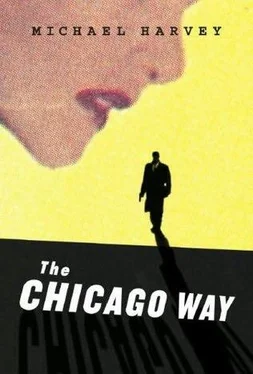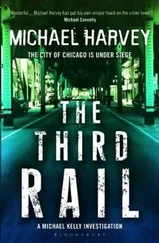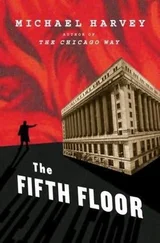Michael Harvey - The Chicago Way
Здесь есть возможность читать онлайн «Michael Harvey - The Chicago Way» весь текст электронной книги совершенно бесплатно (целиком полную версию без сокращений). В некоторых случаях можно слушать аудио, скачать через торрент в формате fb2 и присутствует краткое содержание. Жанр: Полицейский детектив, на английском языке. Описание произведения, (предисловие) а так же отзывы посетителей доступны на портале библиотеки ЛибКат.
- Название:The Chicago Way
- Автор:
- Жанр:
- Год:неизвестен
- ISBN:нет данных
- Рейтинг книги:5 / 5. Голосов: 1
-
Избранное:Добавить в избранное
- Отзывы:
-
Ваша оценка:
- 100
- 1
- 2
- 3
- 4
- 5
The Chicago Way: краткое содержание, описание и аннотация
Предлагаем к чтению аннотацию, описание, краткое содержание или предисловие (зависит от того, что написал сам автор книги «The Chicago Way»). Если вы не нашли необходимую информацию о книге — напишите в комментариях, мы постараемся отыскать её.
The Chicago Way — читать онлайн бесплатно полную книгу (весь текст) целиком
Ниже представлен текст книги, разбитый по страницам. Система сохранения места последней прочитанной страницы, позволяет с удобством читать онлайн бесплатно книгу «The Chicago Way», без необходимости каждый раз заново искать на чём Вы остановились. Поставьте закладку, и сможете в любой момент перейти на страницу, на которой закончили чтение.
Интервал:
Закладка:
“Your girl. How old did you say she was?”
“About twenty.”
“Raped, you say?”
“I did.”
Goshen stopped turning pages.
“Did she fight?”
“Is she in the book, Ray?”
Goshen looked at me like I should be happy I wasn’t stuffed underneath Grime’s house and left there for a good while.
“How the fuck do I know? Let me take a look.”
He returned to the ledger.
“You get a lot of people coming in here?” I said.
“Sure,” Goshen said. “People like police officers. You know, the guys who actually belong here.”
I snuck a look at the pages as Goshen turned. The entries were all handwritten. The first page I saw was dated January 1, 1934. Goshen stopped turning again.
“Yeah, yeah, I know. Fucking ancient. But you know what? Handwriting makes people think about what they put in. And besides, it’s pretty damn hard to disguise your scrawl, in case you ever tried. So we say, fuck the computers. Let everyone write it all out. We just keep adding pages to the ledger. And there it is.”
Goshen was flipping pages now. Each was large and took two hands to turn.
“Is this the only copy?” I said.
“Fucking pessimist. Yeah, it’s the only copy and been the only copy for most of the last century. Fucking pessimists.”
He stopped the turning.
“Here we go. The crime happened in 1997, right?”
“Right.”
“We search by file number. Page by page. Here. This covers 1980 through the nineties.”
Goshen unclipped the ledger and split up the hundred or so pages cataloging two decades of Chicago crime.
“Don’t fuck these up,” he said.
“I got it.”
Fifteen minutes later Goshen found an entry.
“Goddamn it, Kelly.”
“Yeah?”
“Elaine Remington, December twenty-fourth, 1997?”
“Yeah.”
“Next time come in with a goddamn case number. I ran a search for this evidence just the other day.”
“For who?”
Goshen slammed the ledger closed, blew his nose into a barrel under his desk, and crossed one knee over the other.
“Couple of pukes from the DA’s office.”
“Shit.”
“Yeah.” Goshen smiled. “Thing is, I hate the DA even more than your sorry ass.”
“Lucky for me.”
“Got that right. Told the two of them everything was numbered; go ahead and search the place.”
“How long did they last?”
“First guy. About an hour. Second guy was a go-getter. Went the full day. Never made it off the first floor.”
“Think he ever got close?”
“I know he didn’t. The first floor only carries cases through 1975."
“Didn’t tell that to the DA’s men, huh?”
Goshen gave me the blank gaze of a city bureaucrat, willing to stand there until I figured it out for myself. Or at least until quitting time.
“You have a map of this place?” I said.
Goshen tapped his forehead.
“Right here. But you have to ask the right question. Let’s go.”
The elevator was a birdcage job with one of those old cranks you have to hold down until you get to your floor. Goshen turned it on with a skeleton-looking key, and we started up. The warehouse man kept his eyes fixed on the crank. Not because he didn’t know how to work it, but because his alternative was to look at me. Didn’t exactly make me feel warm inside. Still, we were moving.
“Fifth floor,” Goshen said. “Nineteen ninety through ’99.”
He cracked the elevator door and we walked out. Rows of iron shelving stretched upward and ran off into the darkness. Bits of light from what might have been bulbs filtered down from the rafters. Useless except as a reminder to go back downstairs and get a flashlight. Fortunately, Goshen was ahead of the game. He jumped into a forklift and pulled a flash from his pocket.
“Let’s go,” he said, and powered up the lift. I got in and we drove.
“Kind of a big place, this fifth floor, Ray.”
“Lot of sick fucks, Kelly. Lot of sick fucks. This is it. The late nineties.”
Goshen played a light over lumps of black, coffin boxes of evidence covered in dust. Forgotten by everyone. Cataloged by Ray.
“Here, put these on.”
Goshen handed me a set of latex gloves and a white breather. I started at one end of an aisle. He started at the other. The work was slow, box by box. Pull one off the shelf, open it up, and pick through the pieces of old crimes.
Some of the material was strictly forensic: small plastic bags of hair, blood smears, or nails clipped off a corpse.
Then there was the echo of what was once a life.
In one box, coloring books, the pictures half finished, a child’s name in crayon, smeared with blood.
In another, a CD of Pearl Jam’s Ten, AMANDA scrawled on the cover with a flower. Underneath the CD, a calendar from 1996. Filled with dates that never mattered. People never met. A life never lived and now forgotten.
Two hours into the process, I picked up a small box with 12/24/97 scrawled across the side. My heart tightened for two reasons. That was the day of Elaine Remington’s attack. Even better, the signature on the box belonged to John Gibbons.
Goshen was around the corner working on another aisle. I sliced open the box and found a single manila envelope inside. It appeared to be intact, with Gibbons’ initials and the date written across the red evidence seal. I sliced through the seal and slid out a single item, a green women’s polo gashed in several places and crusted with blood, now the color of rust. I felt a presence at my elbow.
“What you got?” Goshen said.
I showed him the evidence box.
“The date is right and it’s got Gibbons’ name,” I said. “But there’s no case number.”
Goshen picked up the envelope and turned it over. His fingers were thin, nails long and ragged.
“Nothing on the envelope, either.” The warehouse man winked. “Almost like someone wanted it to be lost.”
“I’m thinking this is the shirt my victim was wearing.”
“I’m thinking you might be half-ass right for once. Let’s go back to the office.”
We sat down with two cans of Old Style and the shirt between us. It was almost winter in Chicago but mid-July in Goshen’s cubbyhole. A fan chugged away in one corner. Goshen popped open his beer and pushed half the can past an impossibly large Adam’s apple, never taking his eyes off the shirt. And never touching it.
“Officially,” he said, “this piece of evidence doesn’t really exist. No case number, no log-in report, no other identifying marks.”
Goshen craned his neck, rolled his eyes, and pushed at the shirt with a pencil.
“I got to go out and clean up that fucking mess you made out there. When I come back, I have a lot of work to do. I don’t want you here, and I don’t want any more distractions lying around. You got it?”
I got it.
“You really don’t like the DA, do you?” I said.
Goshen gave me a look of pure nothing and left. Like any good civil servant, he cherished institutional hatred, nurtured the otherwise forgotten slight, and polished a grudge like it was gold. Whatever the DA’s office had done to Goshen, it wasn’t good for them. For me, however, it was a different story entirely. I picked up the shirt carefully, folded it into its envelope, and slipped out of the warehouse. As quickly and as quietly as I could.
CHAPTER 17
I returned to my office and slid the green polo into one of those secret hiding places they teach you in private-investigator school. Also known as my bottom left-hand drawer. Then I turned on the radio. ESPN was doing a hot-stove report on the Cubbies. Be still my heart.
I listened intently, pondering deep thoughts, such as what manner of men might pay Alfonso Soriano $136 million to play baseball and where, pray tell, I might get such a gig. Then I noticed a piece of paper slipped under my door. I walked over and picked it up. Eat-A-Pita was having a special on char-grilled shrimp pitas layered with onions and wasabi sauce. I turned off the hot stove and was about to head out when the phone rang. I didn’t recognize the number but picked up anyway.
Читать дальшеИнтервал:
Закладка:
Похожие книги на «The Chicago Way»
Представляем Вашему вниманию похожие книги на «The Chicago Way» списком для выбора. Мы отобрали схожую по названию и смыслу литературу в надежде предоставить читателям больше вариантов отыскать новые, интересные, ещё непрочитанные произведения.
Обсуждение, отзывы о книге «The Chicago Way» и просто собственные мнения читателей. Оставьте ваши комментарии, напишите, что Вы думаете о произведении, его смысле или главных героях. Укажите что конкретно понравилось, а что нет, и почему Вы так считаете.












